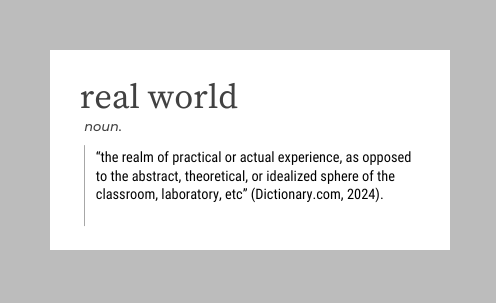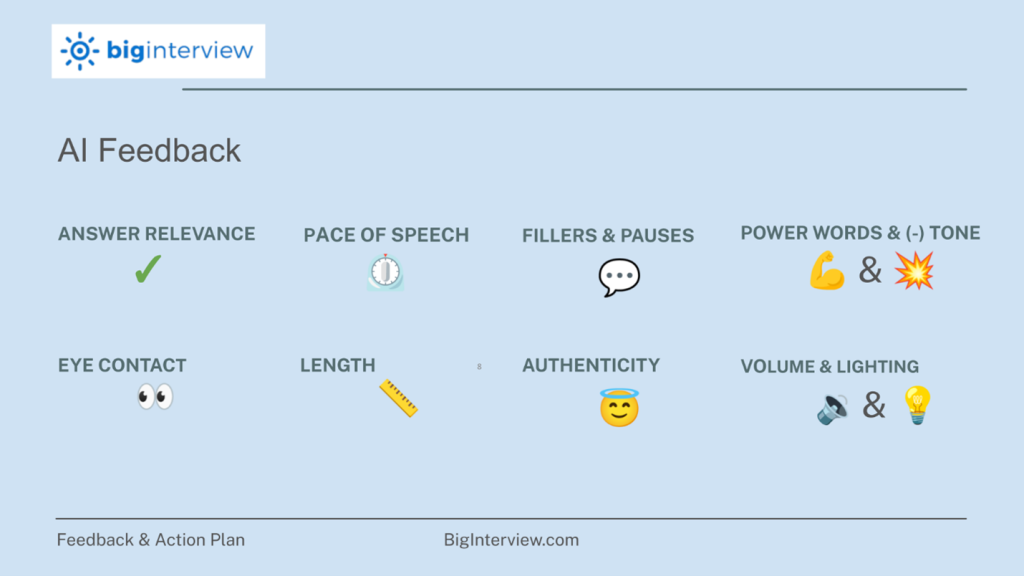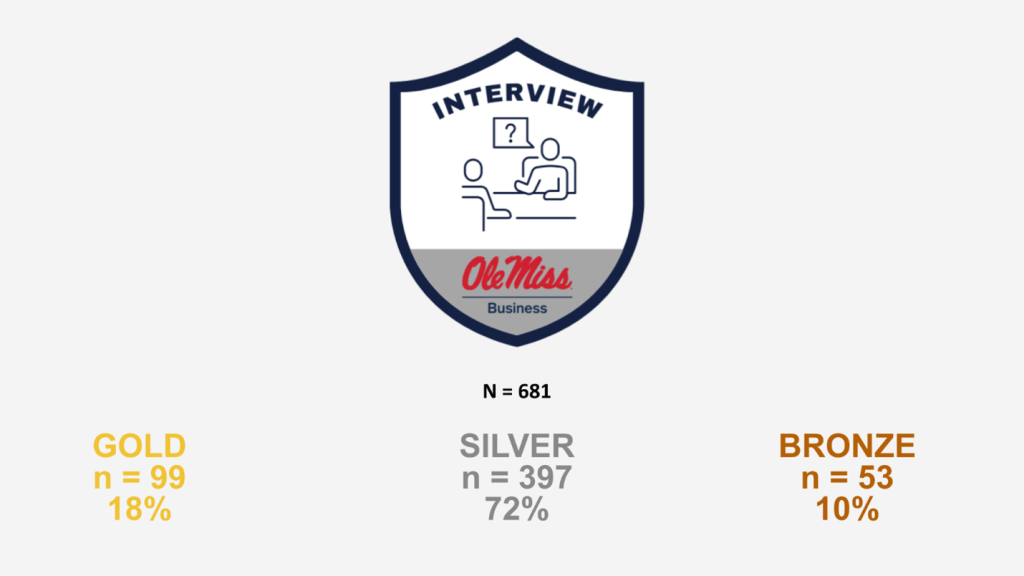Authenticity Inside and Outside the Classroom | Equipping and Training Business Students for The Real World
Published by: WCET | 6/13/2024
Tags: Artificial Intelligence, Digital Learning, Managing Digital Learning, Online Learning, Student Success
Published by: WCET | 6/13/2024
Tags: Artificial Intelligence, Digital Learning, Managing Digital Learning, Online Learning, Student Success
Here at WCET, we are thrilled when we have an opportunity delve deeper into the real-world impact of AI on higher education. To that end, we welcome Meg Barnes from the University of Mississippi’s School of Business, who joins as today to discuss the various ways (including with the help of AI) that their students learn and practice some of the most important workplace skills today. Thank you Meg for sharing about these excellent practices.
Enjoy the read,
Lindsey Downs, WCET
How the University of Mississippi’s School of Business exposes, trains, and equips students in authenticity.

In a world where individuals are often overwhelmed by digital messaging or synthetic media or disengaged from the tangible world, how can educators guide students in honing, seeking, and delivering authenticity in the real world?

Educators have a call to action to integrate authenticity in the current technological and AI era through our lesson plans and curriculum. This case study offers emerging educational lessons and initial stages in infusing authenticity into our business communication course.
Authenticity may be generally described as being genuine about one’s business and real with others. Authenticity can be built and propelled by practical self-knowledge and self-awareness, relevance to the task, genuineness, context, and strategies regarding disclosures (Rosh & Offermann, 2013).
Innovative responses to digital communication, AI, and technology in education, such as fostering critical thinking about information, are crucial. Teaching approaches include encouraging the evaluation of information and compelling students to reflect upon ethical implications (Woodring, 2023). Moreover, faculty play a pivotal role in this process, challenging students to question and doubt while searching for relevant and dependable information.
There is an ever increasing expectation of launching job-ready candidates quickly post course/program/certificate completion. Therefore, there is also a focus on helping students reconcile their learning and transfer their knowledge, skills, and experiences to different contexts, such as a work setting. Billett (2015) has proposed the need for authentic experiences and instances integrated within the overall college curriculum; his educational research highlights the power of authentic experiences by students in both pedagogic and occupational practices.
At the University of Mississippi’s School of Business, we value experiences that help our students develop these important skills. Our university’s Quality Enhancement Plan (QEP) targets critical thinking. One tenet of this plan includes: “Gather pertinent facts or ideas to explore complex issues or problems,” and an associated learning outcome from the rubric includes “credible sources” (Think Forward, 2019, p. 94).
As a fun and impactful activity in the business communication curriculum, students explore and ponder the question of a credible source – Who is an influencer, expert, or authority? We provide a sample video by a popular YouTuber. As a class, we explore the video, the individual’s LinkedIn profile. Then we consider the YouTuber’s disclaimer in their video and their disclosure statement: “One big disclaimer here. I’m not a financial advisor. I’m a guy on the internet; the ideas presented in this video are for entertainment purposes only. You (and only you) are responsible for the financial decisions that you make” (Nate O’Brien, 2023).
To explore credible sources further, our business librarian has created a specific video titled “Is this source legit? Verifying Author/Creator Authority.”
“Finding credible sources can be challenging because so much information is readily available that appears legitimate on the surface. Students need to be skeptical of information not coming from vetted sources. You may find exactly what you’re looking for in Google search, but before you use it, you need to verify the authority and background of the author or entity. If you are unsure about a source’s credibility, contact your librarian.”
– Ashley Dees, University of Mississippi, Research & Instruction Librarian and Associate Professor
In addition to the critical thinking experiences, students in our business communication course are introduced to ethical communication with decision-making and self-awareness. Micro-skills are targeted for developing strong and ethical questions, , reflective skepticism, gathering relevant information, challenging assumptions, fresh perspective building, mitigating biases, weighing evidence, and purposeful strategic steps (Saltzman, 2020). The course is infused with ethical principles, emphasizing practical and real-world applications of ethics, such as surfacing one’s biases and the importance of integrity (McCombs School of Business – The University of Texas at Austin, 2024).
As part of the course, students are given the opportunity to earn certificates through LinkedIn. The students are given a menu of choices and guided through the course and certification process, which helps them build the skills needed for the digital economy (LinkedIn, 2024); these relevant skills include generative AI and human skills, such as critical thinking and decision-making, communication and listening, writing, creativity, unconscious bias, and trust. The students in the course (or our Bcom course) take the PrinciplesYou assessment to discover and evaluate their interactional style, specific archetypes, and how they “prefer to think, engage with others, and apply yourself” (PrinciplesYou, 2024). Educators integrate videos, case studies, tech platforms, assessments, and common reads of Influence and Give & Take. The goal is to integrate real-life applications throughout the business communication course. These lesson plans aim to help students gain self-awareness, grow in authenticity and business acumen, and consider how to make sound decisions in real-life situations.
The use of Artificial Intelligence (AI) has increased exponentially over the last few years. AI is being used in so many contexts, especially in teaching and learning and work environments. As these tools will need to be used by our students when they step out into the workplace, it’s imperative that faculty and staff help prepare them during their educational journey.
To improve delivery and authenticity conveyed through the virtual world, individuals need to know the role and use of AI. One of the ways our faculty and instructors introduce students to AI is to help students learn how to use AI programs that give feedback on student presentation skills. Faculty can implement several strategies, such as showing examples of successful presentations by others, offering professional tips, giving constructive feedback, and the opportunity (Jaser et al., 2022) to test drive AI. Business communication courses allow low-stakes assessments to connect and engage with a virtual audience in preparation for higher stakes situations in the digital world as the students develop their career progression with future recruiters, managers, and team members.
The Big Interview platform is a job training tool for students to practice their interview and presentation skills. Its artificial intelligence evaluates a presenter’s delivery and content in areas such as relevance of an answer to a question, rate of speech, filler counter, sophisticated vocabulary, power words, pauses, eye contact, negative tone, length of response, authenticity, volume, and lighting.
“Big Interview has been an invaluable tool to help our students prepare for virtual interviews. One area that can be difficult to showcase in an online interview is your authentic self. Through both instructor and AI feedback, we can coach students to convey their true personality and unique strengths, ensuring they present a genuine and confident version of themselves during the interview.”
– Wesley Dickens, University of Mississippi, Associate Director of Experiential Learning & Partnerships and Business Communication Faculty

Big Interview is a popular simulation and traditional job training tool for interviews and a novel use application for presentation skills with smart scoring of self-presentation criteria. It helps students learn how to stand out from others by providing instant feedback, bot scoring, concrete advice, and a personalized action plan to improve responses (Big Interview, 2024). Big Interview is designed to boost confidence, impress bots and real-life reviewers, and equip students for communication in their future workplace. Powerful features include feedback regarding authenticity and behaviors associated with authentic gestures and delivery. These virtual asynchronous simulations are designed to prepare students for presentations. The practice and assignment sessions provide 360° feedback for students with instructor review, self-review, other-review, and AI scoring.
The Ole Miss Business Communication undergraduate curriculum is a sophomore-level course, but the students include those in traditional sophomore status from the accumulation of campus course credits and, more recently, dual enrollment students with a sophomore status who may be taking courses on the campus for the first time. These students are in the early stages of learning about their communication, delivery, and engagement styles. From a snapshot of the aggregated data of students, the smart scorings for most of our business students were in the Silver tier, with Gold and Bronze following.

From the Big Interview simulated sessions and gathering of comments from these students, the following impacts surfaced:
The most interesting part about this business communications course would probably be the virtual experiences and the interviews. Those both stood out to me because I took the most away from them.
The most interesting aspect of the material was the AI feedback. I realized the importance of maintaining eye contact during interviews and focusing on the end goal.
I will remember the Big Interview interactions. These really helped me understand how to act and present myself in a real-life interview through the mock-interview type questions and video replies.
Public and professional speaking is already something that makes me nervous and having to answer a certain way and get graded was very nerve racking. I think videoing myself and having to make eye contact with the camera was a big reason it was challenging…I had to avoid eye contact with myself on the screen because I would lose my concentration.
I will remember the knowledge I gained about interviews through Big Interview. Big Interview taught me a lot about the importance of preparing for an interview. The importance of answering questions honestly, selling yourself, maintaining eye contact are all useful tools in being successful in pursuing a job you want.
I think my biggest improvement was eye contact during presentations. I have always been a good speaker, but for online/video presentations, my eye contact has always been a weakness.
The “Big Interview” section (in) this business communication course (is the) most exhilarating, influential, and impactful component. “Big Interview” instructs students how to arrive at interviews, speak with clarity and sophistication (about) important interview and workplace interactions, dress accordingly, and respectfully relate to superiors and subordinates.
I believe that the Big Interview program is something that I will remember for the rest of my life. The tips that were shared with me throughout that process are something I will use throughout my entire career.
This Big Interview data, comments, and themes from Ole Miss Business School mirrored the positive results found in a study conducted by Western Carolina University. The researchers in this study noted the benefits for students from these virtual simulations included:
With the increasing exposure and use of artificial intelligence, the demands of digital communication, and the accelerated pace of our work and home lives, an expected resurgence and appreciation of authenticity is likely. Educators have an opportunity to guide and build confidence with students through this emerging era. It is exciting to see the opportunities offered by innovations such as AI.
We can venture beyond the confines of a more controlled and traditional academic method; it’s time to consider creative approaches, innovative resources, and diverse pathways to train and point students toward their future.
Director of Career Preparation, Management Instructor, University of Mississippi
References
Billett, S. (2015). Integrating practice-based experiences with higher education. Professional and Practice-Based Learning, 13, 1-26. https://doi.org/10.1007/978-94-017-7230-3_1
Big Interview. (2024). Try the Big Interview Training tool. https://www.biginterview.com/
Dictionary.com. (2024). Real world. In Dictionary.com. Retrieved May 15, 2024, from https://www.dictionary.com/browse/real-world
Fulk, H. K. Dent, H. L., Kapakos, W. A., & White, B. J. (2022). Doing more with less: Using AI-based Big Interview to combine exam preparation and interview practice. Issues in Information Systems, 23(4), 204-217. https://doi.org/10.48009/4_iis_2022_118
Gaba, D. M. (2004, October). The future vision of simulation in health care. BMI Quality and Safety, 13(suppl 1), i2-i10. https://doi.org/10.1136/qshc.2004.009878
Jaser, Z., Petrakaki, D., Starr, R., & Oyarbide-Magana, E. (2022, January 27). Where automated job interviews fall short. Harvard Business Review. https://hbr.org/2022/01/where-automated-job-interviews-fall-short
LinkedIn. (2024). Build the skills you need for the digital economy. LinkedIn Learning. https://opportunity.linkedin.com/skills-for-in-demand-jobs
McCombs School of Business – The University of Texas at Austin. (2024). Ethics unwrapped. https://ethicsunwrapped.utexas.edu/subject-area/behavioral-ethics
Nate O’Brien. (2023, March 6). Stock market for beginners 2023 | How to invest (step-by-step tutorial) [Video]. YouTube. https://youtu.be/g4H4Fj_NVKE?si=77buTUzdl_9_ZE1k
PrinciplesYou. (2024). The new personality assessment from Ray Dalio. https://principlesyou.com/
Rosh, L., & Offerman, L. (2013, October). Be yourself, but carefully. Harvard Business Review. https://hbr.org/2013/10/be-yourself-but-carefully
Saltzman, B. (2020. Critical thinking for better judgment and decision-making [Video}. LinkedIn. https://www.linkedin.com/learning/critical-thinking-for-better-judgment-and-decision-making/upgrading-critical-thinking-2
Think Forward. (2019, January). Quality Enhancement Plan. University of Mississippi. https://thinkforward.olemiss.edu/
West Carolina University. (2023, January 20). Study: AI helps students with test prep, interview practice. https://www.wcu.edu/learn/departments-schools-colleges/cob/about-the-college-of-business/ideas-with-impact/posts/ai-tools-help-students-with-test-prep-aspx
Woodring, D. (2023, September 23). Redefining authenticity in the AI era. Texas Computer Education Association. https://blog.tcea.org/education-ai-era/#:~:text=The%20rise%20of%20advanced%20AI%20systems%2C%20like%20generative,towards%20fostering%20skills%20that%20AI%20can%E2%80%99t%20easily%20replace.